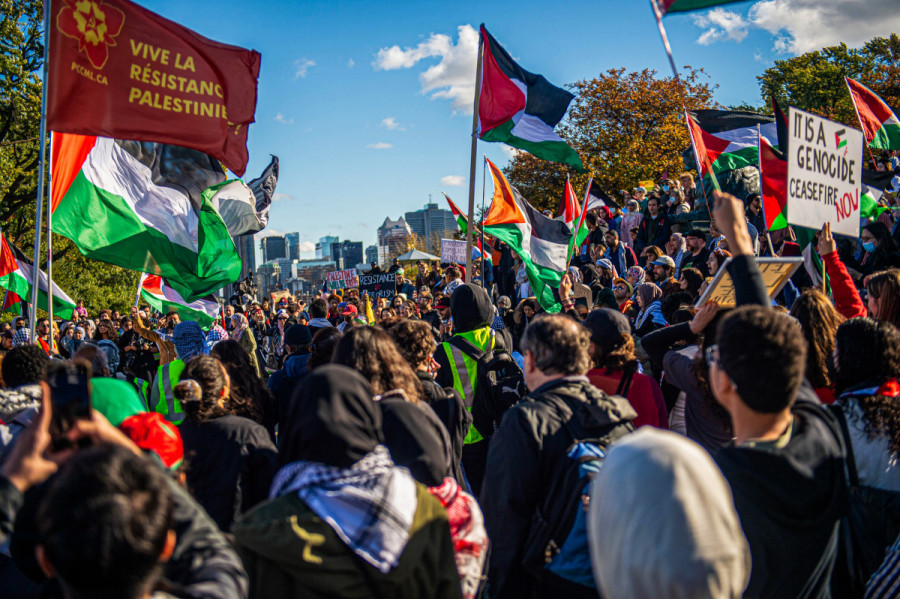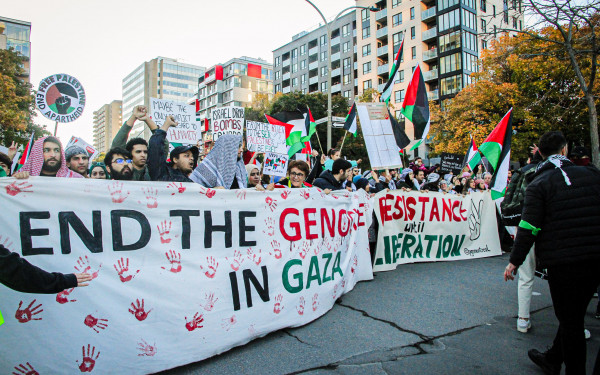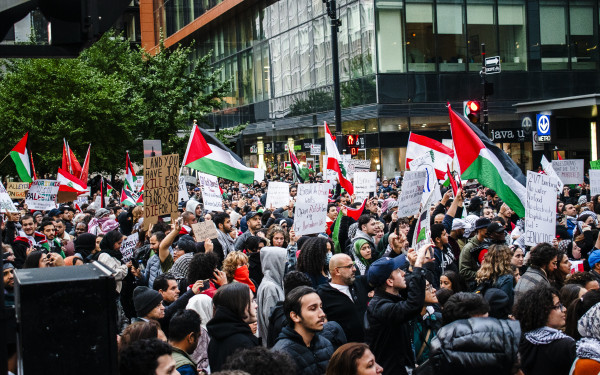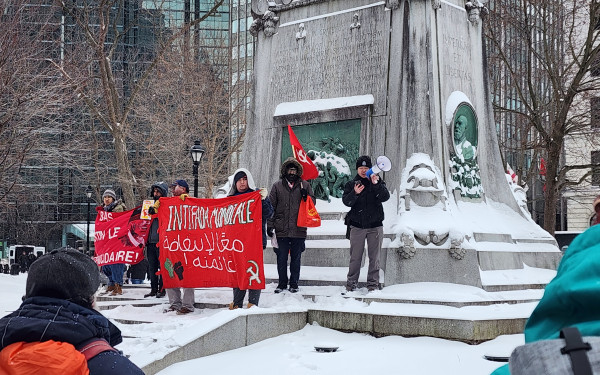Montrealers create Palestinian safe space
Activists push for justice in the light of government support for Israel
Saturday, Oct. 7 was an average work day for Ibrahim Chamseddine.
He was in a butcher shop serving meat and chicken to customers. It seemed to him like they were going about their daily tasks “like nothing was happening.”
Chamseddine was not able to check his phone because he was working, but “[he] really wanted to hear the news (from Palestine) to know what was going on.”
“In this situation and in this moment, how come you can be there, living your life like normal?” he said.
In response, Chamseddine decided to initiate the daily Palestinian kiosk at Dorchester Square. After his work day, he drives to the location and sets up a black tent from which large Palestinian flags hang.
From 3 p.m. onwards, he hands out informational flyers to passersby, tapes keffiyehs to the surrounding benches, and invites strangers to converse on the situation in Palestine.
On Oct. 27, while Chamseddine hung posters around the tent, a woman walked up and asked what the initiative was for. A volunteer responded that it was to help raise awareness about the genocide in the Gaza Strip.
The woman stood silently for a while before breaking into sobs.
“I am Palestinian,” she said.
Since its launch, the response to the project has been consistent. “People come hugging and crying, and beg for us to continue showing support, to not forget about Palestine,” Chamseddine said.
On the longer days, Chamseddine returns home to his pregnant wife and three-year-old daughter at 10 p.m. In the five years the couple has been together, “[he has] never been this far from [his] family.”
Despite this, Chamseddine believes his efforts are “nothing.”
“I should do more,” he said. “People over there (Palestine) have sacrificed a lot more than that. As a human being, if you go to sleep while doing nothing, and you feel okay, that’s you. But for myself, I cannot go to bed at night, living my days while this is happening.”
On Oct. 27, Internet, cellular, and landline communication services in the Gaza Strip were completely lost following direct Israeli bombings on the area’s telecommunications infrastructure. Wounded people on the ground, for instance, were no longer capable of getting in contact with ambulance services. The Palestinian Red Crescent Society had “completely lost contact with the operation rooms in the Gaza Strip” and its staff.
On Oct. 29, the services were gradually restored by Paltel Group, the telecom company in Gaza, but remain unstable.
Following the destruction of the centre, air raids were increased and ground forces were “expanding their activity,” as intensive air strikes and artillery shells “could be heard at the same time,” according to Al Jazeera journalist Safwat Kahlout. Regarding Israeli bombardment, Oct. 27 has been considered to be the “worst” since Oct. 7.
Israel has also threatened to bomb the Al-Shifa Hospital in Gaza, the city’s largest hospital, which is currently sheltering 50,000 displaced Palestinians. The Israel Defense Forces (IDF) allege that “it acts as the main headquarters for Hamas’ terrorist activity” and they “will operate to uncover any terrorist infrastructure.”
“Seven thousand (Palestinian deaths) in three weeks,” said Hiba Masri, who decided to join Chamseddine in his initiative after watching him set up on Oct. 27. “And this is before they die of hunger and thirst.”
“I wouldn’t [have] forgiven myself,” she said when asked why she got involved. “Knowing what they’re going through, that kind of suffering. You’re watching all your loved ones be crushed by rubble.”
“I know this is happening. How dare I stay silent?” she said. “I don’t know what it is that I should do to make it stop, but I know I have to do things.”
Masri is half Palestinian. However, she shares how she’s “never felt a sense of identity” to Palestine until she “saw the response.”
“I realized how proud I am to be Palestinian,” she added. “When I saw doctors say that they’re not leaving their patient’s side, that they’ll just have to be killed instead. Seeing people with nothing still digging up rubble to help other people.”
“Is this what it is to be Palestinian? Then I’m Palestinian.”
On Oct. 9, the Israeli defence minister said that the IDF is fighting against “human animals,” following the Hamas surprise attack two days prior.
Masri said she doesn’t understand how “anyone could believe this shit.”
“Do Palestinians not go grocery shopping? Do they not come home to their families and kiss their kids goodnight?” She hopes that “the humanity in people starts to wake up.”
On Oct. 27, the United Nations’ (UN) emergency session adopted a non-binding Jordanian resolution on the “protection of civilians and upholding legal and humanitarian obligations” regarding the crisis in Gaza. The resolution also calls for an “immediate, durable and sustained humanitarian truce leading to a cessation of hostilities.”
In total, 121 countries voted in favour of the resolution. Canada and 43 others abstained from the vote. The United States, Israel and 12 other countries voted against it.
Canada proposed an amendment “seeking an explicit condemnation of Hamas.” The motion was supported by over 35 countries, including the United States, yet did not pass as it failed to get support from two thirds of the member states.
“I’ve been feeling really helpless in regards to the response of governments, media and the UN,” said Arielle, a Montreal-based member and mobilizer with Independent Jewish Voices (IJV), who wished to remain anonymous for safety reasons. “I’ve lost a lot of faith in their willingness to listen to us and to act in our best interest, if I even ever had it.”
Arielle believes that the only way the government is going to do the right thing will be through the consistency of pro-Palestinian activism.
“It’s up to us,” they said. “And that’s really scary. It’s really disheartening. It’s the foundation of Canada, being involved in colonial projects.”
Prime Minister Justin Trudeau “reaffirmed Canada’s support for Israel’s right to defend itself in accordance with international law” and that “Hamas terrorists aren’t a resistance. They aren’t freedom fighters. They are terrorists.”
“Folks need to understand that if they’re living in Canada, this is being done in their names,” Arielle said.
“By virtue of their government supporting it, either financially or morally, with their statements or UN votes, their support is in your name and supposedly in your interest,” they added.
Arielle reiterated the importance of getting involved in local activism for Palestine. Several demonstrations around the city have been organized by pro-Palestine activists and advocacy groups, gathering tens of thousands of supporters to bring about an immediate ceasefire.
“It will be a long march to freedom,” they said.
This article originally appeared in Volume 44, Issue 5, published October 31, 2023.





_2_600_375_90_s_c1.jpg)

